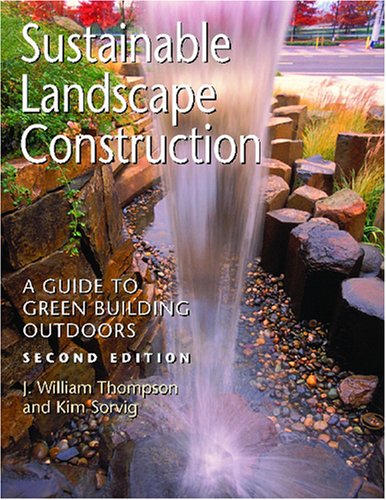

Most ebook files are in PDF format, so you can easily read them using various software such as Foxit Reader or directly on the Google Chrome browser.
Some ebook files are released by publishers in other formats such as .awz, .mobi, .epub, .fb2, etc. You may need to install specific software to read these formats on mobile/PC, such as Calibre.
Please read the tutorial at this link. https://ebooknice.com/page/post?id=faq
We offer FREE conversion to the popular formats you request; however, this may take some time. Therefore, right after payment, please email us, and we will try to provide the service as quickly as possible.
For some exceptional file formats or broken links (if any), please refrain from opening any disputes. Instead, email us first, and we will try to assist within a maximum of 6 hours.
EbookNice Team

Status:
Available4.8
39 reviews(Ebook) Sustainable Landscape Construction A Guide to Green Building Outdoors 2nd Edition by J William Thompson, Kim Sorvig - Ebook PDF Instant Download/Delivery: 9781597261425 ,1597261424
Full download (Ebook) Sustainable Landscape Construction A Guide to Green Building Outdoors 2nd Edition after payment

Product details:
ISBN 10: 1597261424
ISBN 13: 9781597261425
Author: J William Thompson, Kim Sorvig
Published at the beginning of the twenty-first century, __Sustainable Landscape Construction__ took a new approach to what was then a nearly new subject: how to construct outdoor environments based on principles of sustainability. This enormously influential book helped to spur a movement that has taken root around the U.S. and throughout the world. The second edition has been thoroughly updated to include the most important developments in this landscape revolution, along with the latest scientific research in the field. It has been expanded to provide even more ideas for designing, building, and maintaining environmentally sensitive landscapes. It is essential reading for everyone with an interest in “green” landscape design.
Like its predecessor, the new edition of __Sustainable Landscape Construction__ is organized around principles that reflect the authors’ desire to put environmental ethics into practice. Each chapter focuses on one over-arching idea. These principles of sustainability are clearly articulated and are developed through specific examples. More than 100 projects from around the globe are described and illustrated. A new chapter details ways in which landscape architectural practice must respond to the dangers posed by fire, floods, drought, extreme storms, and climate change.
__Sustainable Landscape Construction__ is a crucial complement to basic landscape construction texts, and is a one-of-a-kind reference for professionals, students, and concerned citizens
(Ebook) Sustainable Landscape Construction A Guide to Green Building Outdoors 2nd Edition Table of contents:
What Is a Healthy Site?
Take a Role in “Pre-construction”
Do Your Homework First: Knowledge as Sustainability
Avoid Survey Damage
Minimize Utility Damage
Physically Protect Site During Construction
Preserve Healthy Topsoil
Save Every Possible Existing Tree—Even Just One
Use Appropriate Construction Machinery
Related Design and Planning Issues
Coordination and Follow-up
Resources
Turn Wastelands to Gardens
Balance the Environmental Costs and Benefits of Restoration
Involve the Community in Site Restoration
Restore Landscapes Structurally
Restore Damaged Soils On-site
Restore Regionally Appropriate Vegetation
Restore Forests and Coexist with Wildfire
Resources
Hold Slopes in Place with Biotechnical Erosion Control
Make Vertical Structures “Habitat-able” with Greenwalls
Turn Barren Roof Spaces into “Greenroofs”
Construct for and with Plants
Evaluate Turf: The Green, the Bad, and the Ugly
Count on Plants to Sustain
Resources
Work with the Site’s Water Regime
Understand, Protect, and Restore Natural Wetlands
Restore Rivers and Streams to Full Health
Collect and Conserve Water
Irrigate Intelligently and Sparingly
Reuse Graywater
Purify Water at Every Opportunity
Test Modern Hardware for Cleaner Piped Stormwater
Let Constructed Wetlands Treat Water
Resources
Plan and Design to Reduce Paving
Take Advantage of “Context-sensitive Road Design”
Use Techniques That Reduce Runoff from Paving
Use Porous Paving Materials
Cool Asphalt with Planting and Albedo
Resources
Recall Some Simple Guidelines
Let Reuse Be Re-inspiration
Use Local, Salvaged, or Recycled Materials
Evaluate Environmental Costs When Choosing Suppliers
Use Sustainably Harvested Renewables
Avoid Toxic and Nonrenewable Materials
Know General Toxicity Issues by Material Type
Avoid Three Controversial Materials
Prioritize Hazard-reduction Efforts
Resources
Understand How Landscape Energy Use Is Different
Manage Energy for Machines, Tools, and Labor
Embodied Energy—Why Do We Care?
Use Life-cycle Costing to Justify Sustainable Design
Apply Guidelines for Landscape Energy Conservation
Resources
Respect the Need for Darkness
Talk Lighting—a Brief Glossary
Use Lighting Efficiently
Try Low-voltage Lighting for Flexibility
Evaluate Lamp Performance
Join the LED Lighting Revolution
Resources
Understand Noise Terminology
Be Aware of Damage Caused by Noise
Don’t Rely on Noise “Barriers” in Most Landscapes
Try Noise-absorbing Barriers
Modify Pavement to Reduce Road Noise
Make Noise Invisible
Fight Noise with Noise
Push for Quieter Landscape Tools
Protect “Soundscapes” Through Planning
Resources
Know the Resource Costs of Conventional Landscape Maintenance
Plan for Maintainable Spaces
Expect Change
Use Appropriate Machinery and Fuels
Switch to Bio-based Maintenance Products
Apply Integrated Pest Management
Use Fertilizers Sustainably
Don’t Waste On-site Resources
Consider Alternatives to Mowing
Adapt to Using Native Plants
Manage Large Public Landscapes Holistically, Too
Evaluate Life-cycle Costs of Maintenance Options
Coordinate Design, Construction, and Maintenance
Resources
People also search for (Ebook) Sustainable Landscape Construction A Guide to Green Building Outdoors 2nd Edition:
quality landscape construction
landscape architect sustainable
green city landscape & construction pte ltd
hi green landscape & construction pte ltd
sustainable landscape ohio
Tags: J William Thompson, Kim Sorvig, Sustainable Landscape Construction, Green Building Outdoors